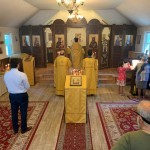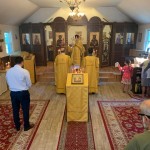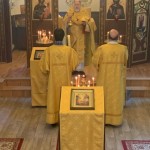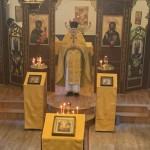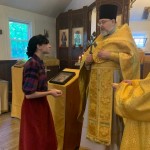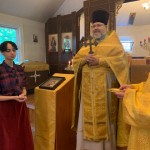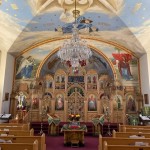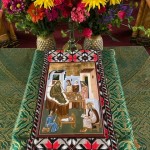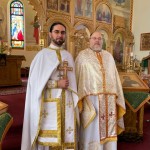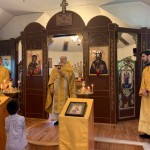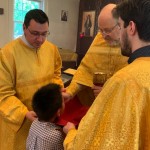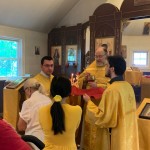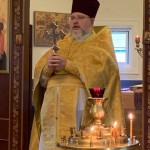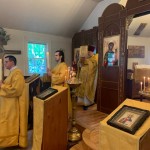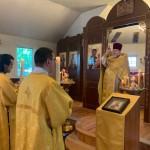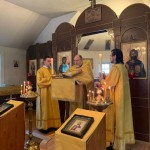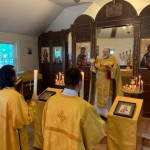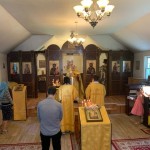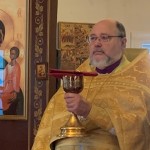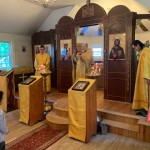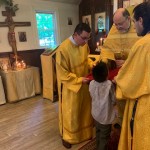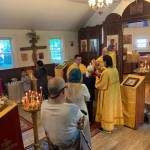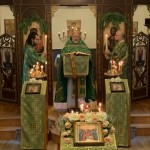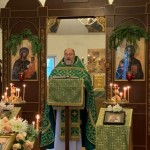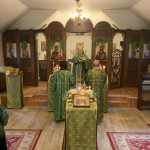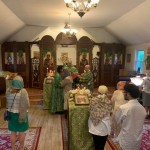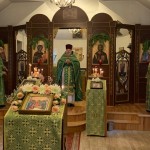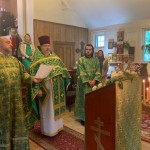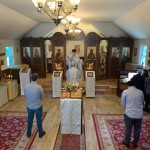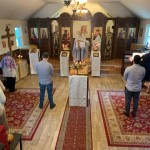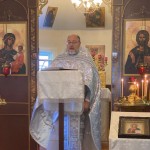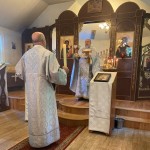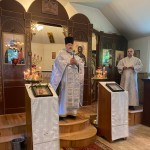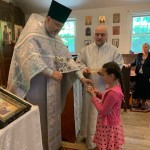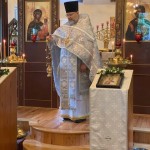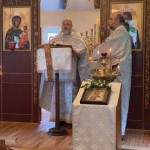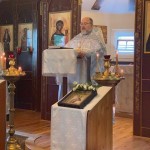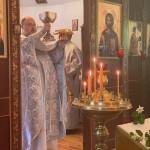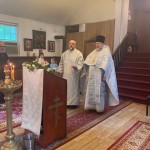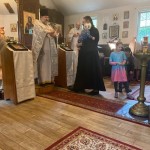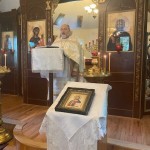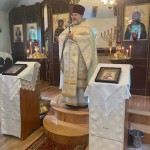On July 10, on the 4th Sunday after Pentecost we had a nice celebration at St. George Church. Our Rector, Archpriest Igor Tarasov served the Divine Liturgy. After the Gospel lesson he preached the following homily:
“Dear brothers and sisters in Christ! Today the Gospel lesson tells us about the healing of the servant of the Roman centurion. That servant was probably a slave but we learn that the centurion cared about his slave, did not consider him expandable. According to his faith the Lord granted his servant healing”.
“And in today’s Epistle lesson Holy Apostle Paul is reasoning about such thing as slavery. Recently we celebrated Independence Day, an American national holiday commemorating acquiring freedom and sovereignty of this nation from the slavery to the British Empire. But even after getting independence the American society knew such thing as slavery. In a number of American states people had other men and women as slaves. The society had to undergo a painful process of Civil War to end that shameful practice of slavery”.
“Our Lord Jesus Christ and His Apostles lived in the ancient times when slavery was a normal thing. It became especially spread after Rome became an empire. Every fourth person living in the capital city of Rome was a slave. Slaves had no rights, they were considered a property of their masters. They could not make any important decisions for themselves. They could be punished, tortured or killed by their masters without any consequences. They were bought and sold”.
“Today we commemorate Venerable Sampson who is honored as an unmercenary physician. St. Sampson who was named the Hospitable lived in ancient Rome and he owned slaves. When he inherited his father’s property, he decided to follow the Gospel advice and to give up his wealth. One of the things he did was giving his slaves freedom”.
“This is why, dear brothers and sisters, when St. Paul was writing his Epistle to the Christians in Rome, he had to consider this reality. And in today’s Epistle he uses the terms “slaves”, “slavery” and “freedom” to be better understood by his listeners. Let us then try to understand the main ideas of today’s reading of the Holy Apostle”.
“Our main slavery is a slavery to sin. It started when man sinned and became fallen. The mission of our Lord Jesus Christ was to set us free from that slavery. His mission was successful. All who follow Christ and become baptized are freed from sin of Adam and are given a right to become admitted to the society of Saints. Now we no longer belong to the devil, to the sin, but to Jesus Christ who is our Lord and Master. This is why St. Paul says in today’s Epistle lesson, “Having been set free from sin, you became slaves of righteousness” (Rom. 6, 18). God means righteousness and justice; God means goodness and truth; God means holiness and purity. This is why, if we now belong to Him, speaking in human terms of the times of St. Paul, we are “slaves of righteousness”. We are slaves of God’s holiness, of His goodness, of His truth and His love”.
“St. Paul further reasons that being enslaved by God demands to fulfill His will. St. Paul says, “For just as you presented your members as slaves of uncleanness, and a lawlessness…, so now present your members as slaves of righteousness for holiness” (Rom. 6, 19). If we wish to belong to Jesus Christ, then our life has to be a service to righteousness and acquiring of holiness. We cannot betray our Master by serving other masters such as our passions, sins and the devil”.
“We should add here that belonging to Jesus Christ, becoming a slave of righteousness is totally voluntary thing. We embrace that kind of service voluntarily. If we truly understand that such slavery is our true home and our true dignity, we accept it and live by it being happy. We also understand that we Christians are by far better off than so called “free men” in the world. St. Paul teaches us in today’s lesson that the fruit of slavery to Christ is holiness and eternal life. But the fruit of being free from Christ is death. He says, “What fruit did you have then in the things of which you are now ashamed? For the end of those things is death. But now having been set free from sin, and having your fruit to holiness, and the end, everlasting life” (Rom. 6, 21-22)”.
“Therefore, dear brothers and sisters, humanity needs to choose. As two thousand years ago when St. Paul lived, so today, men have to choose between slavery to righteousness. In fact, such slavery will real freedom and independence. Jesus Christ by His sacrifice on the cross, by His Redemption accomplished for us, made this choice possible. But it is up to us which slavery to choose. It is our voluntary choice which master to submit. Either we choose our Jesus Christ, the Son of God to be our Lord and Master and to become slaves of righteousness, or we may choose to become or continue to be slaves of sin. There is no other option. We may be deluded by sin to think that if we are free from religious and other traditional rules, then we are truly free people living according to our own will. Many people fell for that. In our times people who wish to be free from the Church, from the traditional values are deluded. They think that they are free, but they are miserable slaves of their own passions, sins and eventually, the slaves of the devil and death. A very painful example is the raise of the gay movement. In our times, American cities hold so-called gay parades which they even call the “parades of pride”. Homosexuals show their pride of being lawless in their lifestyle. Sinners show that they are proud to sin. And every mayor of our city participates in that shameful action putting a disgrace on this city and on its leadership. Well, they can show that but all of them should be aware of the words of St. Paul, “The wages of sin is death” (Rom. 6, 23)”.
“Dear brothers and sisters! Our presence here, in this holy temple is supposed to show that we made a choice to be slaves of righteousness. Let us then serve our only Master, the Lord Jesus Christ. Let us present our members not as slaves to uncleanness for lawlessness as many people do, but as slaves of righteousness for holiness. This slavery will bring us eternal life. This slavery will make us truly free, free from sin. It will make us truly independent, independent from the tricks of the devil. If we do differently, we may inherit eternal death. Let us remember the words of St. Paul: “The wages of sin is death, but the gift of God is eternal life in Christ Jesus our Lord” (Rom. 6, 23).
During the Litany of Fervent Supplication the Rector had a petition for the suffering country of Ukraine and its people. He also added a commemoration of the “suffering Ukrainian land” at the Great Entrance.
The choir nicely performed the hymns to the Most Holy Theotokos.
Following the dismissal of the Liturgy the Rector made some announcements and greeted Johanna Pugliese on the occasion of her name day, the memory of St. Johanna, one of the Myrrh-Bearing Women. Traditional Polychronion was proclaimed and the Thotokian prosphora presented.
After the Liturgy the Rector performed the memorial Litia to commemorate his grandfather Yuri Tarasov on the occasion of his 110th birth anniversary. Olga Roussanow also asked to add the commemoration of her deceased family members.
Following the services the Rector hosted a memorial lunch at the nearby Chinese restaurant.

